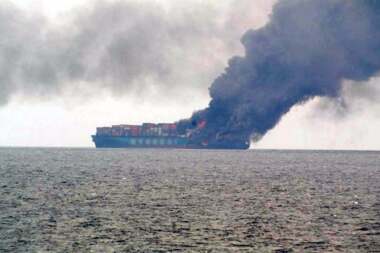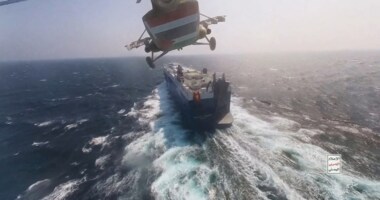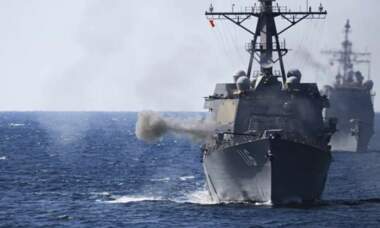
SANA'A December 23. 2023 (Saba) - In light of the Zionist arrogance in continuing to commit more brutal massacres against the civilians of the proud people of Gaza... comes the Yemeni courage represented by the bold and courageous stance to afflict the Zionist enemy entity with almost complete economic paralysis.
The Yemeni Armed Forces’ announcement of preventing the passage of ships heading to the Zionist enemy entity, Yemen’s position in supporting Gaza entered a new phase of escalation. The decision to prevent the passage of all ships heading to the entity’s ports is tantamount to a siege that is suffocating the usurping enemy entity.
The Zionist enemy entity is facing an almost complete naval blockade for the first time in its history, isolating it from the most important waterway through which its ships, imports and exports have been sailing for decades.
On the one hand, the brave and gradual Yemeni decision made the enemy entity face a strategic crisis related to one of its most important strategic pillars on which it built its national security.
For the first time in its history, the Zionist enemy entity is facing a crisis related to its most vital foundation, which is the closure of the Red Sea, which it considers the main lifeline for its maritime trade.
On the other hand, the Yemeni decision raised the cost of shipping to it due to the behavior of its ships heading to it via long shipping routes.
The strategic importance of the Red Sea to the Zionist security system lies in the fact that it is the only corridor that gives it a maritime outlet to Africa and East Asia, and it was one of the first steps taken by the enemy entity after announcing its establishment in 1948.
The brave Yemeni decision to close the Red Sea is considered the first of its kind in terms of implementation and also in that it included what resembled a complete blockade on the Zionists historically, Yemen closed Bab al-Mandab in the 1973 war, but the matter did not last and was not implemented in an effective way to impose the blockade.
Yemen also defeated the most important strategic goals of the enemy entity since its inception, which is securing trade routes through the Red Sea.
On the military level, the Zionist enemy entity has many bases in the Horn of Africa, which it established over the past decades to secure Zionist trade to Africa, which Jewish commercial companies rushed to invade from an early time.
The decision to close Bab al-Mandab to Zionist ships caused an almost complete paralysis of Zionist trade, according to multiple sources.
Zionist sources confirm that the port of Eilat was completely paralyzed and at least 40,000 Zionist workers who were working in factories and maritime trade were laid off.
It also indicated that phosphate and cement exports to African countries had stopped, and 20 percent of the imports of this temporary entity had stopped.
According to the Zionist newspaper "Haaretz", the Zionist enemy entity does not practice any trade by land as Europe does, for example, and relies heavily on its sea ports, through which more than 98 percent of the Zionist goods trade passes.
According to the Zionist website "Globes", Yemen's operations in the Red Sea caused an increase in transport prices from China to the occupying entity during the first week.
Observers believe that the Yemeni decision to close the Red Sea forced Zionist ships, firstly, to pass through the Cape of Good Hope, and secondly, placing the entity under an almost complete naval blockade.
Not only do shipping and insurance prices rise and Zionist ships change their course, but it is also accompanied by delays and traffic jams in larger numbers than usual.
In this context, insurance premiums on enemy ships increased more than before with a decrease in the volume of dealing with them, which represents a major blow to the enemy’s economy.
It is worth noting that the decision to close the Bab al-Mandab Strait represented a powerful strategic blow that cut off the dreams of Zionist expansion in the southern direction of the Red Sea and in the direction of the Yemeni islands and shores.
M.M

